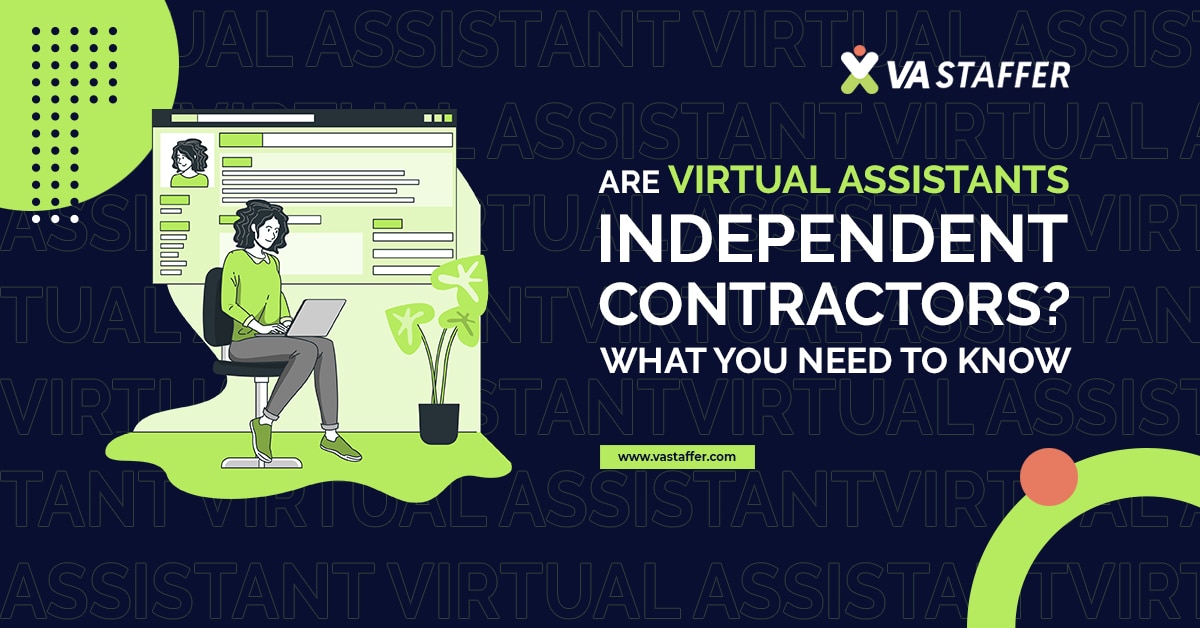Are virtual assistants independent contractors or full-time employees? This question has become increasingly relevant as businesses turn to remote workers for administrative support. In this article, we’ll investigate the character of virtual assistants and their status in the labor force.
We’ll begin by defining what a virtual assistant is and discussing the benefits of hiring one for your business. Next, we’ll delve into whether they are considered independent contractors or not, and how this distinction impacts both parties involved.
Furthermore, we will provide guidance on finding the right virtual assistant to suit your needs and share valuable tips for working effectively with them. By understanding the intricacies of “virtual assistants as independent contractors,” you can make informed decisions that will lead your business to new heights.
Table of Contents:
- What is a Virtual Assistant?
- Benefits of Hiring a Virtual Assistant
- Are Virtual Assistants Independent Contractors?
- Tips for Working with a Virtual Assistant
- Frequently Asked Questions Are Virtual Assistants Independent Contractors
- Conclusion
1. What is a Virtual Assistant?
A virtual assistant is an independent contractor who provides administrative, creative, and technical services to clients remotely. Virtual assistants are proficient experts in various domains such as marketing, website development, content generation, social media administration, and more. They work from their own office or home setup and communicate with clients via email, phone calls, video conferencing tools like Zoom, or project management platforms such as Asana.
The rise of virtual assistants has been propelled by the development of technology, making it possible for companies and remote employees to communicate effortlessly. This has opened up opportunities for entrepreneurs and business owners to access top talent without being restricted by geographical boundaries.
- Administrative tasks: A virtual assistant can handle tasks such as data entry, calendar management, travel arrangements booking appointments.
- Creative services: From graphic design to copywriting or video editing – a VA can help you create visually appealing content that resonates with your target audience.
- Social media management: Keeping up with multiple social media accounts can be time-consuming; a virtual assistant can manage your profiles while ensuring consistent branding across all channels.
- Email marketing: Crafting compelling newsletters takes skill – outsource this task to a VA experienced in creating engaging emails designed to convert subscribers into customers.
- Tech support: If you’re not tech-savvy yourself or simply don’t have the time for troubleshooting issues on your website – enlist the help of a knowledgeable VA who specializes in IT support.
By hiring a virtual assistant, you can delegate tasks that may be time-consuming or outside your area of expertise, allowing you to focus on what matters most – growing your business.
A Virtual Assistant is a professional who provides administrative, technical, or creative assistance to clients remotely. By hiring a Virtual Assistant, entrepreneurs can save time and money while increasing productivity. Now let’s explore the benefits of having one on your team.
2. Benefits of Hiring a Virtual Assistant
Hiring a virtual assistant can help entrepreneurs save time and money while increasing productivity and efficiency. As independent contractors, virtual assistants offer several advantages that make them an attractive option for busy professionals.
Cost Savings
One of the main benefits of hiring a virtual assistant is the cost savings compared to hiring full-time employees. With virtual assistants, you don’t need to stress over offering advantages such as medical coverage or paid leave. Additionally, you only pay for the hours worked, which means no wasted resources on idle employees during slow periods.
Flexibility
A virtual assistant offers flexibility in terms of workload and availability. They can work on-demand or be contracted for specific projects or tasks when needed. Business owners can adjust the size of their staff contingent on their requirements without having to commit to permanent contracts.
Increase Productivity
- Delegation: By delegating routine administrative tasks like email management, scheduling appointments, and social media updates to your VA, you free up valuable time that can be spent focusing on more important aspects of your business.
- Faster Turnaround Time: A skilled VA will complete tasks efficiently with minimal supervision required from you – this results in faster turnaround times for projects and assignments.
- Diverse Skillset: VAs often possess diverse skill sets ranging from graphic design to web development; by tapping into these skills when needed businesses benefit from increased overall productivity levels within their organization.
Better Work-Life Balance
Entrepreneurs and busy executives often struggle to maintain a healthy work-life balance. By outsourcing tasks to a virtual assistant, you can reclaim valuable personal time that would otherwise be spent on mundane administrative duties. This allows for better focus on both professional and personal goals, leading to increased overall well-being.
Access to Global Talent
Hiring a virtual assistant opens up the opportunity to access talent from around the world. With platforms like Upwork or Freelancer, you can find highly skilled professionals in various fields who may not be available locally. This global reach ensures your business has access to top-quality services without being limited by geographical constraints.
Engaging a Virtual Assistant can be of great help to occupied business owners, allowing them to concentrate on the more essential duties and enhance their efficiency. By understanding whether or not virtual assistants are independent contractors, businesses will gain greater insight into how they should manage these relationships.
3. Are Virtual Assistants Independent Contractors?
Yes, virtual assistants are independent contractors who are responsible for their own taxes and insurance. This means that when you hire a virtual assistant, you’re not taking on the responsibilities of an employer, such as providing benefits or dealing with payroll taxes. Instead, your VA is essentially running their own business and offering their services to you.
Navigating Legal Requirements
To ensure compliance with local laws and regulations when working with virtual assistants as independent contractors it’s important that both parties understand the distinction between contractor status versus employee status. Misclassifying workers can lead to fines and penalties imposed by government agencies such as the IRS in the United States (source). It’s crucial that businesses consult legal professionals familiar with labor laws in relevant jurisdictions before entering into agreements with VAs.
Maintaining Proper Documentation
It is essential to create a thorough agreement that details the scope of work, payment conditions, and other significant facets of the collaboration in order to ensure mutual understanding between both parties. This will help protect both parties from potential disputes and ensure compliance with local laws.
Virtual assistants are independent contractors, but it is important to take the time to find a qualified virtual assistant that meets your specific needs. Exploring methods for identifying an appropriate virtual assistant to fit your enterprise’s needs is something that should be taken seriously.
5. Tips for Working with a Virtual Assistant
When working with a virtual assistant, it’s important to know what you should and should not do. Set clear expectations, provide feedback regularly, and communicate often. By following these best practices, you can ensure that your partnership is successful and productive.
A. Set Clear Expectations
Before starting any project or task with your virtual assistant, make sure to clearly outline the scope of work required and the expected outcomes. This will help both parties understand their responsibilities and avoid misunderstandings down the line.
- Create a detailed project brief outlining tasks, deadlines, and deliverables.
- Establish communication channels (email, phone calls) for updates on progress.
- Determine key performance indicators (KPIs) to measure success in achieving goals.
B. Provide Regular Feedback
Giving constructive feedback is essential when working with an independent contractor like a virtual assistant. It helps them improve their skills while ensuring they meet your specific needs effectively:
- Schedule regular check-ins or meetings to discuss progress on projects/tasks.
Provide actionable suggestions for improvement, focusing on areas where they may need additional guidance or support.
Celebrate successes by acknowledging milestones reached or exceptional work delivered.
C. Communicate Often
Open lines of communication are crucial when collaborating remotely, as it helps build trust and ensures everyone is on the same page. Consider these tips for effective communication with your virtual assistant.
Utilize tools like Slack or Microsoft Teams to facilitate real-time conversations and collaboration.
- Schedule regular video calls to maintain a personal connection, especially when discussing complex tasks or projects.
- Establish clear expectations around response times, so both parties know when they can expect replies to messages or updates on tasks.
By utilizing these tips, you’ll be able to manage your remote assistant efficiently. Remember that open communication, clear expectations, and regular feedback are key components of any successful partnership between an entrepreneur and their independent contractor support team.
Frequently Asked Questions Are Virtual Assistants Independent Contractors
Is a virtual assistant an independent contractor?
Yes, a virtual assistant is typically considered an independent contractor. They are self-employed professionals who provide administrative, technical, or creative assistance to clients remotely. As contractors, they handle their own taxes and expenses.
Is a virtual assistant an employee or a contractor?
A virtual assistant is generally classified as a contractor rather than an employee. This means that businesses hiring them do not have the same responsibilities as with employees, such as providing benefits or withholding taxes.
Are virtual assistants 1099 employees?
Virtual assistants are not technically “employees,” but they may be referred to as 1099 workers, meaning they receive IRS Form 1099-MISC for tax purposes instead of W-2 forms given to traditional employees. If you’re hiring virtual assistants in the Philippines, you will need them to fill out a W8-BEN Form.
Is a virtual assistant an employee?
No, a virtual assistant is not considered an employee. They operate independently and offer their services on contractual terms without being bound by typical employer-employee relationships. Businesses working with VAs avoid many obligations associated with hiring full-time staff members.
Conclusion
By studying the advantages of recruiting a virtual assistant, you can decide whether it is suitable for your needs. With the right research, dedication, and communication with your VA, you can ensure success when working together on projects.
Reach out to us now and we’ll help you find the right VA for you.


